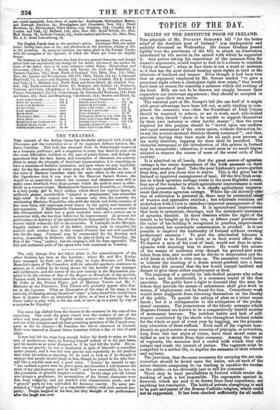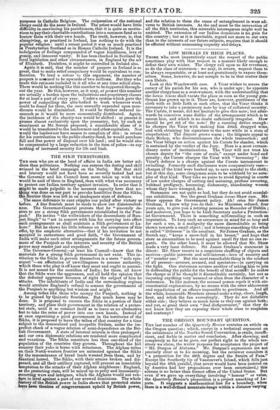TOPICS OF THE DAY.
RELIEF OF THE DESTITUTE POOR OF IRELAND.
THE principle of Mr. POULETT SCROPE'S bill "for the better relief of the destitute poor of Ireland " was inadequately and unfairly discussed on Wednesday. Sir James Graham passed lightly over the provisions of the bill, to attack an illustration introduced by the mover in the speech with which he supported it. Any person taking his impression of the measure from Sir James's arguments, would expect to find in it a clause to establish "fixity of tenure" ; when in fact there is not a word or sentence in it that has the most distant bearing upon rights in, land or the relations of landlord and tenant. Even though it had been true that an argument employed by Mr. Scrope tended " to give a perpetual right where a contingent right now exists," that would have been no reason for rejecting a measure which did nothing of the kind. Bills are not to be thrown out 'simply because their supporters use irrelevant arguments; they should be accepted or rejected upon their own merits. The essential part of Mr. Scrape's bill (for one half of it might with great advantage have been left out, as only tending to com- plicate the measure) was—that the Guardians of Irish Unions should be required to relieve, or set to work, such able-bodied poor as they should "deem to be unable to support themselves by their own industry or other lawful means' ; that the sums required for this purpose should be " levied upon one uniform and equal assessment of the entire union, without distinction be- tween the several electoral districts therein contained"; and that, provision having thus been made for all such poor persons as are really destitute, begging for alms shall be punished. The obstacles interposed to the introduction of this system in Ireland may be insuperable; otherwise, it would seem in no small degree adapted to remove the causes of some of the worst evils of that country. It is admitted on all hands, that the great source of agrarian outrage is the entire dependence of the Irish peasants on their scraps and nooks of land. Take the poor Irishman's potato-garden from him, and you doom him to starve. This is the great bar in Ireland to improved management of land. Of the five Irish coun- ties in which agrarian outrage exists to the most frightful extent, four are of the number in which agricultural improvement is most actively prosecuted. In fact, it is chiefly agricultural improve- ment that creates agrarian outrage. Where the old slovenly 's. tem of cultivation is persisted in, there may be occasional of wanton and oppressive eviction ; but wholesale evictions a • undertaken with a view to introduce improved management of the land and increased •prOduction. It is agricultural improvement that leads to systematic clearings, and the systematic resistance of agrarian banditti. In those districts where the right of the tenant to be bought up by five, ten, or fifteen years' purchase of the value of his holding is recognized in practice, improvement is obstructed, but systematic assassination is avoided. Is it not possible to improve the husbandry of Ireland without creating professional assassins ? To give the able-bodied labourer a legal 'right to be found in work or in food would effect this. To deprive a man of his rood of land, would not then be syno- nymous with dooming him to starve. He would feel secure of the means of existence even though his ground-plot were taken from him, and would not be driven to desperation and the wild deeds to which it stirs men up. The peasantry would learn to tolerate the massing of a dozen potato-gardens into a farm when they felt assured that the law would compel landlord and farmer to give them either employment or food. The imposing of a penalty on able-bodied paupers who refuse to work, and on mendicants, is a necessary sequel of the first provision. The public have a right to demand that the man for whom they provide the means of subsistence shall give work in return, if employment can be found for him. Compulsory work would deter sluggards from throwing themselves on the charity of the public. To punish the asking of alms as a crime seems harsh ; but it is indispensable to the extirpation of the profes- sional assassins. The perpetrators of the bloody outrages which disgrace Ireland are known to be a comparatively limited number of mercenary bravoes. The indolent habits and lack of self- respect contracted by the shoals who throughout Ireland subsist for the whole or part of every year by begging, are the prepara- tory education of these ruffians. Even such of the vagrant men- dicants as good-nature or some remains of principle, or cowardice, keep from this last abyss of crime, have their moral sense so dulled as not to shrink from their company. Among the heaps of vagrants, the assassins find a crowd with which they can mingle and evade the pursuit of justice. The vagrants must be compelled to a settled life, to deprive the assassins of their schools and asylums.
The provision, that the sums necessary for carrying the act into execution should be levied upon the union, not on each of the minor districts composing it—as tending to equalize the burden on the public—is too obviously just to call for comment.
There may be local peculiarities in Ireland which render the working of such a law impossible. The arguments against it, however, which are said to be drawn from local experience, are anything but conclusive. The habit of private almsgiving is said to be part and parcel of the Roman Catholic religion, which could not be suppressed. It has been checked sufficiently for all useful purposes in Catholic Belgium. The cooperation of the national clergy could do the same in Ireland., The priest would have little difficulty in convincing his parishioners, that it is quite as merito- rious to pay their charitable contributions into a common fund as to bestow them with their own hands. The truth, however, is, that alraggiving, as practised in Ireland, has nothing to do with the popular religion : until a recent period it was as much practised in Presbyterian Scotland as in Roman Catholic Ireland. It is the indulgence of feelings compounded of vague kindliness, love of gossip, and innocent vanity. It has been checked in Scotland by local legislation and other circumstances, in England by the act of Elizabeth. Doubtless, it might be controlled in Ireland also. Again it is said, that the number of paupers in Ireland is so great, that to make relief compulsory would be equivalent to con- fiscation. To lend a colour to this argument, the number of paupers is assumed to be upwards of two millions. But they who made this estimate included in it all who at any time solicit alms. There would be nothing like this number to be supported through- out the year. Be this, however, as it may, at present this number are actually a burden upon the industrious and proprietary classes for at least a part of every year. Under a system which gave the power of compelling the able-bodied to work whenever work could be found for them, the sum annually expended upon men- dicants would be diminished. It would be further reduced in- asmuch as it 'would be more economically distributed. Again, the incidence of the charity-tax would be shifted : at present it presses almost exclusively upon the peasantry, but, by such an enactment as Mr. Scrope proposed, a considerable share of it would be transferred to the landowners and other capitalists. Nor would the landowner have reason to complain of this : in return for his contribution to the public charity-fund, he would purchase full and free power of disposal over his land ; and he would also be compensated by a large reduction in the item of police—to say nothing of increased security for life and limb.



























 Previous page
Previous page